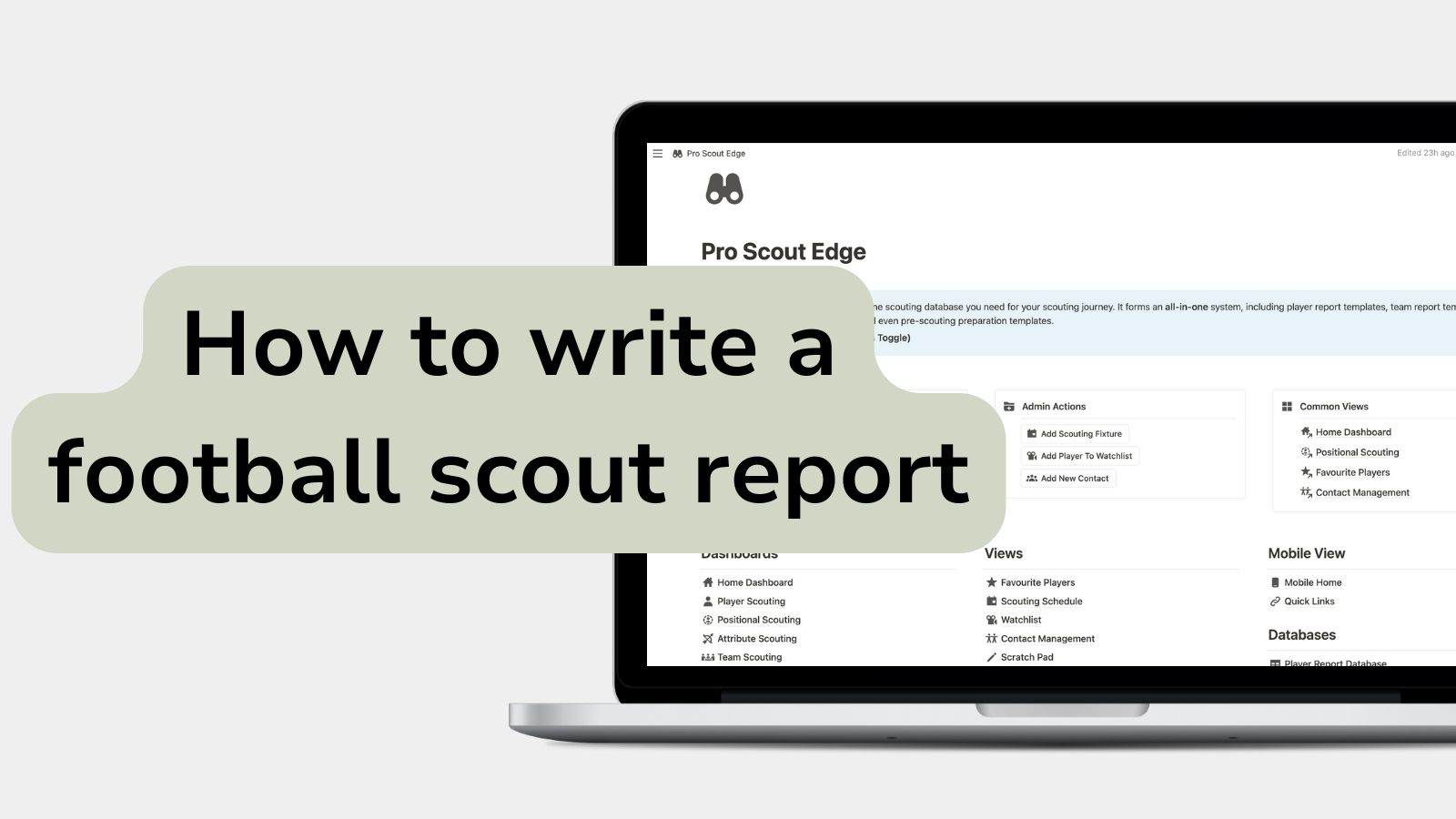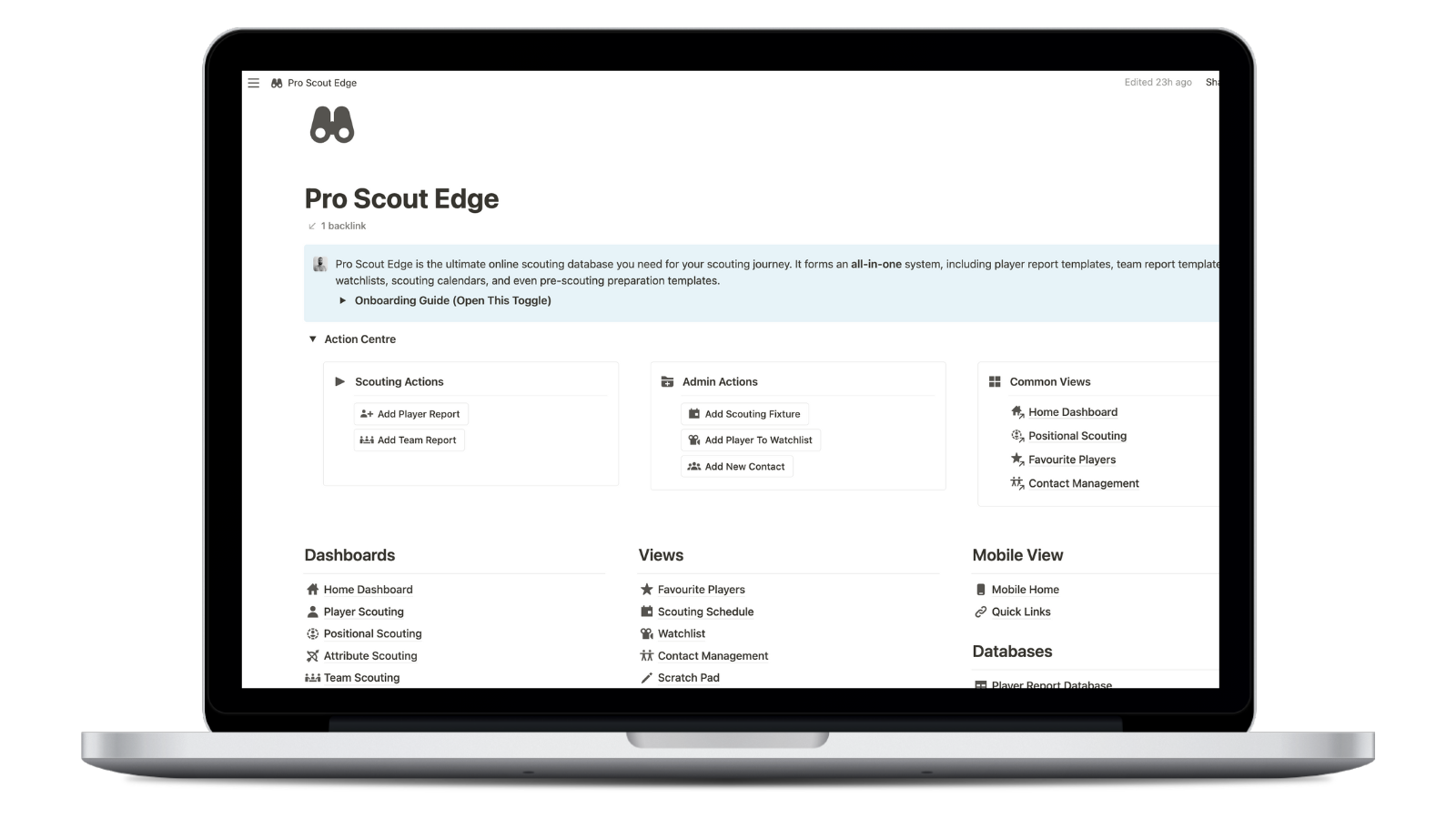How to write a football scout report

Football scouting is considered a dream job amongst many. It’s a brilliant world of identifying and reporting on footballers, going to games, tracking players and recommending signings. However, a lot of people don’t know where to start, don’t know what to look for, and don’t know how to write scout reports. So I’m here to help.
This article is aimed towards helping new, aspiring and current scouts improve their scouting workflow through advice, scouting cues and my tool: Pro Scout Edge.
Pro Scout Edge
Pro Scout Edge is the ultimate online scouting database you need for your scouting journey. It forms an all-in-one system, including player report templates, team report templates, watchlists, scouting calendars, pre-scouting preparation templates and much more.
It’s been created by professional scouts and tested by experts in the football industry. The tool is ideal for both new and aspiring scouts, as well professional and expert scouts.
There is a special 40% discount for readers of this post - enter the code “SCOUT40” at the checkout.

Types of Reports
Within scouting there are a few different types of reports; they all vary in contents and in length depending on the type and your purpose.
This article will focus on player scout reports but other examples also include:
- Opposition scout reports
- Set-piece scout reports (often included in the above)
- Match reports (more of an overview of a specific game)
- Video specific reports
Selecting Your Fixtures
Before you can start scouting you need to know what you’re going to watch and how. One of the big changes in football since COVID is the increasing volume of games scouted via video. You can now watch hundreds of leagues with the click of a button using video platforms such as Wyscout.
If you don’t work for a club or have access to Wyscout, then there are still ways to watch video games. I’d highly recommend looking at Ben Griffis’ sheet for leagues where all games are live streamed. There are some interesting leagues in here such as Georgia, Latvia, Spain Segunda and many more, all available to watch for free.
Watching, creating and scouting on these different leagues would certainly give you a niche and make you stand out if you can become an expert on a unique league.
If possible get yourself out to live games, nothing beats watching football for yourself in real time. You can get a better feel for the pace, tempo and sound of the game. You’re able to spot things you just wouldn’t catch on video such as off the ball movement, communication, body language and more. So it’s worthwhile, if possible, to get to live games to scout regardless of the level.
Using Pro Scout Edge, you can schedule your videos in ahead of time to know what you’re watching and when.

Pre-Game Notes
As a scout you need to understand context to properly asses a player or a team effectively. Prior to watching a game you need to do your research. You (ideally) shouldn’t just rock up and make notes. Here are some things that you should be researching prior to scouting:
- Form of the teams
- Are there any permutations? Knockouts, relegation, promotion ect
- Any off field issues? transfer embargo, financial issues ect
- Team news - missing or injured players
- Predicted line-ups
- Set-piece takers
- Specific players in form or ones to watch
Using Pro Scout Edge and the fixture template, we can effectively prepare for games. The night before or morning of a game, fill out these templates with the appropriate information. You’ll be surprised how much it helps you focus and improves your scouting.

Report Writing
Now this is all about what works for you. What works for you might not work for someone else. Remember that.
Some scouts like to make direct notes which will be ready for their report straight away. Other scouts like to make rough notes to then be able to expand upon them through recall and watching the game back post-event. Whichever method works for you, Pro Scout Edge will suit you.
I personally make rough notes in Pro Scout Edge using the team report templates, before expanding on individual notes whilst rewatching the game to write individual reports. That's my process, but that may or may not work for you. Try it out.
The Four Corner Model
We need to consider what we're looking for when watching players. Clearly this is the most important skill of a scout. The scouting eye isn't something you'll develop overnight, but it is something you'll improve at over time. So practice makes perfect.
Breaking a player's game down into distinct areas is good way to holistically observe and report on a player. You're touching all bases, leaving no stone unturned. So think about a player's game in these four ways:
- Technical / Tactical
- Physical
- Psychological
- Social
We can go further and break down a player's technical / tactical and physical ability into an in possession and out of possession context. What are they doing on and off the ball? This additional context adds another layer of information which makes it easier to evaluate a players.
So what should you be looking for in each of the four areas? Well, in Pro Scout Edge we have scouting cues. These are intended to provoke and initiate your critical thinking about a player's ability. Here's what you should be looking for in a generic sense:

The player you are scouting, and the position they play will impact what sort of attributes you're looking for within the four corner model. Especially for technical / tactical and physical attributes. This is why we've seen a number of professional clubs (such as Brighton, Newcastle and Norwich) switch to a positional-based scouting structure in their recruitment departments.
Understanding the specific requirements for different roles is something bespoke. They can be defined by your own thoughts on what a right back, or centre forward looks like. Often, they are defined by a club's playing style or philosophy. Regardless, it's important to know specifically what a good player in each position looks like.
To help with this I'd highly recommend reading "Anatomy of a scout". It's a great book for all scouts, and it has some brilliant scouting cues for each position on the pitch. Here's my book review if you want to get a feel as to why it's such a great read.
Tips for better scout reports
One mistake scouts make, especially when starting out is thinking that a scout report has to include absolutely everything - almost making them into short stories. Whilst the intention is great, it won't be read by many. People in football are busy and time is a precious commodity.
Good scout reports are concise and impactful. Getting the crucial information across in way that can be digested quickly is the key. Ensure that the key points are at the surface and not lost in a sea of text.
Scout reports should allow others to dive back into the game, and see your insights through their own eyes. That's why I personally like to include timestamps in my reports. Not every action needs a time stamp, but it is beneficial for things that catch your eye. A good recovery run at pace to show work rate and speed, an excellent moment of link play in a pocket of space, perhaps a moment of communication and leadership. My point is these moments can be rewatched on video so make a note of time so that you, and / or your team can relive that moment.
Set a stopwatch going from kick off on your watch or phone, and use that as a reminder to timestamp if you're scouting live. If you're watching from video, then it's even easier to do.
The best observers of football are ones who can spot reoccurring patterns and actions. These things should catch your attention. Does a player make a movement over and over again? Is this a product of team tactical setup? Is it the player's tactical awareness?
Any repeatable actions you notice should be noted, and try and provide the context of why this is happening. Spotting patterns and knowing why you spotted them will improve your scouting no end.
Summary
- There are different types of scout reports but they mainly involve player or team / opposition scouting.
- There's a lot football you can watch online for free to get scouting. Use Ben Griffis’ sheet for leagues.
- Think about the four corner model when scouting a player. Technical / tactical, physical, psychological and social. How does that look in general attributes and for specific positions?
- Utilise the scouting cues and attributes tags in the Pro Scout Edge scouting tool system for effective reports.
- Read 'Anatomy of a Scout' to gain more insight on being an effective scout.
- Keep your reports concise and impactful. Don't write a short story.
- Consider using timestamps to assist review and relive your thoughts.
- Watch the game for reoccurring patterns and actions. What are they and why are they happening?
